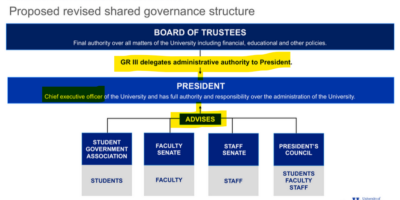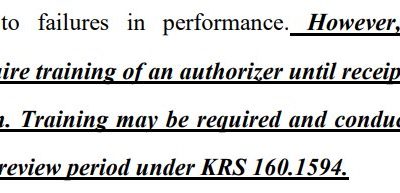The Kentucky Department of Education released its “Year in Review” report last Tuesday, which highlights the department’s accomplishments of the past year and addresses the challenges of the next. While the report fails to even mention in passing the economic problems facing Kentucky’s children, a problem I addressed here two weeks ago in a piece addressed to Commissioner Wayne Lewis, I did find some encouraging language about the state’s graduation standards and teacher recruitment efforts.
The report begins with a discussion of the audit and subsequent state takeover of the management of Jefferson County Public Schools, a controversial move about which much has been written in other forums. Of more interest to Fayette County residents are the goals outlined in the following section—those presented in the 2018-23 Strategic Plan—and more specifically the KPREP score targets for next month’s round of assessments.
Those targets include increases in the percentage of students scoring “proficient” or above in reading:
- In grade 3, from 52.3% to 59.2%
- In grade 5, from 57.8% to 60.6%
- In grade 8, the target of 60.5% was met in 2018.
And in math:
- In grade 3, from 47.3% to 54.7%
- In grade 5, from 50.6% to 52.6%
- In grade 8, from 46.1% to 52.6%
Taken in aggregate, Fayette County schools fell right on the state averages at the elementary, middle, and high school levels, but there was of course considerable variation between, for example, Arlington Elementary, in the Castlewood neighborhood, which in 2018 scored more than 20 percentage points below the state averages in both reading and math, and Clays Mill Elementary, which scored nearly 20 points above in both categories. You can remind yourself of your child’s school’s scores using the Courier-Journal‘s interactive database.
Perceptive Lexingtonians will immediately note, from the two examples I’ve presented above, that there is a considerable disparity in wealth between the neighborhoods those elementary schools serve. Unfortunately, neither the Strategic Plan nor the “Year in Review” see fit to address that core disparity, preferring instead to state objectives that seem deliberately written to sidestep it, such as “maintain effective leadership” and “improve district and school operations.” Perhaps in the future KDE will add “demand Frankfort do more to address poverty in underperforming school districts” to their list of strategies, but that language isn’t there, not yet.
Much more reassuring is the section in the “Year in Review” describing new high school graduation requirements, in light of the substantial gap between the outlandish 93% graduation rate of Kentucky high-schoolers and the ability of may of those graduates to perform at an adequate level upon entering either college or the workforce. The passage noting the “lack of academic preparedness of…freshman students” in Kentucky’s post-secondary institutions will surely resonate with college teachers across the Commonwealth, as it did with me; the problems with first-year academic readiness that I and my colleagues have anecdotally decried for years now seem to have shown up on KDE’s radar.
KDE’s plan to tackle this problem involves the requirement that high school students, prior to graduation, “demonstrate basic competency in mathematics and reading,” based on new guidelines developed in 2018 by a working committee of educators and business leaders. Most of these guidelines involve scoring at particular levels of proficiency on various standardized tests—benchmarks with their own sets of problems, to be sure—but we should applaud KDE’s move to stop graduating students who lack the basic skills in literacy and mathematics that higher education and the workforce will require of them. We won’t see the effects of these guidelines for a few years still, as they won’t be fully implemented until the ninth-grade class of 2020-21, but I’m optimistic that this is a step down the right path.
The “Year in Review” continues with an overview of the much-discussed revision of the KPREP standards by which schools are designated for Comprehensive Support and Improvement (CSI) or Targeted Support and Improvement (TSI). Schools designated for CSI are generally those with significant achievement problems in multiple areas, most often those that score in the bottom 5% of schools statewide, while TSI schools are identified as having more specific issues, such as a large population of non-native English speakers who are currently under-served by existing school resources.

As with the change in graduation standards, the CSI/TSI revisions may take some time to show themselves in the way of quantifiable school improvement, if they do at all. At the risk of beating a dead horse, it is no coincidence that the Fayette County schools designated CSI—elementary schools Arlington, Coventry Oak, Harrison, Mary Todd, Millcreek, William Wells Brown, and Yates—are all, with the exception of Millcreek, located in the comparatively lower-income north/northeast areas of Lexington. Hence, unless KDE’s school-turnaround plans involve better, higher-paying jobs for the residents of the neighborhoods those schools serve, it’s difficult to foresee much lasting success. I suspect this correlation between CSI designation and income level holds up across the state, but you can check for yourself using the Courier-Journal‘s database tool I linked above and the neighborhood-specific income data available here.
Finally, the “Year in Review” highlights the establishment of the “Go Teach KY” program, in which paths to teacher certification are streamlined, and the Kentucky Academy for Equity in Teaching program, which offers debt forgiveness for some portion of the student loans borne by future Kentucky public-school teachers. These are good ideas, but as I wrote earlier this month, examined in context, these programs raise important questions about the unreasonable expectations placed on teachers in low-performing districts, and the difficult workplace environment in which they teach. Surely the exchange of Andy Beshear for Matt Bevin will assuage some of these problems, but until we see Kentucky begin to reverse the problem of teachers “fleeing” the state in record numbers, the success of these programs will be impossible to judge.
Will Commissioner of Education Wayne Lewis be around to judge it? In an op-ed he distributed last week, he doesn’t seem too sure. It’s an odd editorial, that first provides a run-down of his own C.V., and second describes his accomplishments in workforce development since assuming his post. It reads very much like a man pleading to remain in his job, frankly.
But it doesn’t look like he’ll keep it for very long, based on the rhetoric out of Frankfort. In short, Beshear wants a new Board of Education, and Lewis says he won’t be able to work with one, even threatening legal action if Board members are removed without cause. In all the bluster, however, Lewis does raise a fair point, that the Board’s “time is much better spent working together for our students and continuing Kentucky’s momentum with career and technical education, the roll-out of our new academic standards, and improving early learning and special education services, than it would be fighting in court.”
While I loathe Lewis’s charter-school advocacy, and even more so his willful blindness to the problem of poverty in many of Kentucky’s school districts, he has certainly made some strides in his short tenure, though we won’t see the results of his effort for some time. Will Beshear allow Lewis time to see his efforts come to fruition, while perhaps acting as a restraint on Lewis’s impulses toward privatization and teacher-blaming? I’d actually like to see Lewis given a bit more time, although I doubt he’ll receive it. In any event, it’ll make for an interesting political battle. Let’s hope Kentucky students don’t become collateral damage.





Leave a Reply